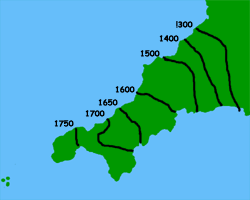
Before the Roman invasion of Britain (55 BC) the Celtic language spoken by the inhabitants was Brythonic (British). When the Romans left Britain (410 AD) the language still survived across the whole country. However the Romans were followed by the Anglo-Saxon invaders, who slowly drove the Celts to the remoter corners of the British Isles.
In the fifth century, the Celts from Cornwall invaded Armorica (Brittany). Although they did not establish a Celtic state, they did sow the seeds for the Breton language that is still alive in Brittany today.
The Celts of Somerset, Dorset, Devon and Cornwall became separated from the Celts of Wales after the Battle of Deorham in about 577. The area controlled by the Celts in the south west of Britain was progressively reduced by the expansion of Wessex over the next few centuries. From then on the Cornish Language developed independently of Welsh.
In 936 AD, King Athelstan’s settlement established the river Tamar as the border between England and Cornwall.
In 1300 the majority of the population of Cornwall spoke Cornish, and it is estimated that around 30,000 spoke it then. However as the population grew, the number of Cornish speakers remained constant at around 30,000, while the number of English speakers grew, and eventually became the majority.
The English tongue was the official first language, but the Cornish people still used their own language in normal life.

The language began to lose ground in the east of Cornwall from 1300, and the demise spread west over the centuries. interaction with the Bretons stimulated the use of Cornish. In the 14th century, monks wrote miracle plays in Cornish known as ‘the Ordinalia’ intended to teach people about the church. The initial revival of Cornish in the early 20th century was based on texts such as these, and the Middle Cornish works. However Cornish is, in reality, a language without a great literary past.
Cornish revolts against the English in 1497 and 1549 led to further decline of the Cornish language. English replaced Latin as the language of the church after the Reformation. The Cornish speaking population wanted Cornish, not English, to replace Latin as the local language of the church. In the event it appears that the bible was never translated into. After the defeat of the Prayer Book Rebellion of 1549, it was even less likely that Cornish could continue as a separate language
English continued to spread west, and Cornish to decline, over the next few centuries. The last monoglot speakers died in the late eighteenth century, although people carried on being bi-lingual throughout the 19th century.
Dolly Pentreath of Mousehole is often cited as the last native Cornish speaker. She died in 1777. Notwithstanding her supposed last words, "Me ne vidn cewsel Sawznek!" ("I don't want to speak English!"), she spoke at least some English as well as Cornish. The last monoglot Cornish speaker is believed to have been Chesten Marchant, who died in 1676 at Gwithian. Certainly Dolly Pentreath spoke Cornish fluently, but she does not seem to have been the last fluent speaker.
It could have been John Davey of Zennor who died in 1891 (who, when he was a boy, learnt to speak some words of Cornish from his grandfather). And even into the 1940's fishermen were counting fish in the Cornish language.
The annual Cornish Gorsedd has been revived since 198, and is modeled on the lines of the Welsh bardic events.
But really one can say that Cornish was no longer a living language by 1900.
So why the revival of the Cornish
Language?
Cornish Language The Cornish Language information